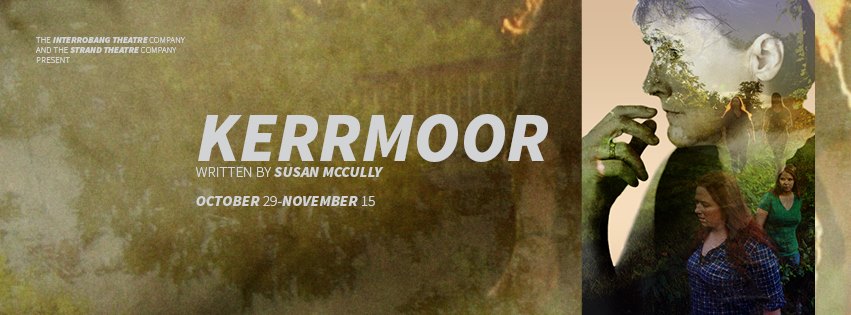The Women’s Voices Theater Festival has surpassed the boundaries of the nation’s capital and meandered over to Baltimore. A city thriving with theatre, it’s an honored opportunity to take part in the festival that has been occurring throughout the 2015 calendar season. In a TheatreBloom exclusive interview, we sit down with playwright Susan McCully to discuss her work Kerrmoor, a Co-Production with Baltimore’s Strand Theatre and Interrobang Theatre Company. Susan McCully is a professor at UMBC where she teaches playwriting and dramatic literature. Her plays have been produced at colleges and universities, as well as fringe/alternative spaces throughout the US and internationally. In addition to Kerrmoor, her farce, Voracious runs November 19-22nd at UMBC
Tell us a little bit about Kerrmoor
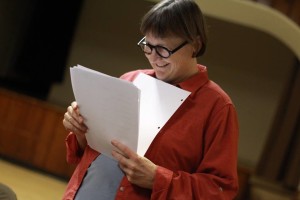
Susan: I’ve been trying to write some version of this play since I got my MFA many, many years ago. It takes place in an imaginary place that is very much about where I grew up in Appalachian Pennsylvania. It’s a play that’s really about both what I really abhor and adore of where I come from. It’s about mountain people who are really insular and don’t ever really leave these very small communities of six houses on a crossroad on the side of a mountain. They’re really backward about relationships other than with their own sort of family, and in a way tribe.
I never felt like I belonged there. I always felt like it was a phobic place in many, many ways, but I also love these people. They are the American mythic sacrifice warriors. They are strong, strong people who will do anything for their family and their neighbors. There’s this kind of deep “of the earth”-ness about them. I grew up with that sense of pride in place and country. I tear up at Fourth of July parades. At the same time those people are mean about others, anyone who is “othered” in any way. I tried to write about that for a long time in a very realistic way but it was never very satisfying. It seemed like it was political in a didactic way that I didn’t care for and felt like I was choosing a side. I couldn’t really get inside the love I had and the admiration I had for those same people.
I’ve written a kind of Greek tragedy. It’s sort of Appalachian Greek tragedy that sort of imagines this place on a mythic kind of level. I’ve decided on this ritual that these Scots-Irish people have lived by for the hundreds of years since they got there. There is this sense of “one girl” who needs to be chosen every twenty years or so when the new generation crops up. This has roots in Indian raids, which was true of people in my family where I grew up, back in the 1700’s. So they create this ritual around cutting the Indian out. The premise of the play is that I am the “girl who was chosen” some time ago, and I was the first girl who got herself pregnant to get out. She was no longer pure. And I’ve left my daughter behind, letting her father and my father keep the girl there.
It takes place in this 24-hour Greek sort of thing. My daughter, who was left behind, has now become the chosen one. And we don’t know what’s going to happen. This is the first time I’ve seen my daughter since I left her there because I was shunned by that community upon leaving. If you’re not of that community, you’re shunned. The story does have some truth, but it’s really more of this huge metaphorical, ridiculous, overblown Greek tragedy. It’s not autobiographical. It’s loosely inspired— no, it’s an American mythos based on that Scots-Irish Appalachian way of being that is dangerous and also really in many ways the way that we look at Americans as heroic.
Where did the title Kerrmoor come from? What does it mean?
Susan: Kerrmoor is the name of the town where my father grew up. It’s about 20 minutes from the big town of 10,000 people in the mountains of Western Pennsylvania. It’s a crossroads on the side of a mountain with eight houses. It’s really fallen into economic decline. It’s a place of American rural poverty. There are no jobs. There’s no industry. Mining is done, so there’s the threat all around of fracking in the sense that you can get rich quick if you can frack. But there’s an economic and environmental disaster just looming around that place. I’m not sure it’s the catchiest title, a lot of people probably just go “what the heck is that?” But there’s music and a mythology around the “Rite of Kerrmoor” that I’ve created for the play. Place is very important to this story, it’s Appalachia.
You mentioned Eve Muson is Directing, and you’re playing one of the characters, who else is a part of the production?
Susan: I’m really lucky that I brought this as a project to Interrobang and Strand together. They’re coming together to produce this piece because it was really a good fit for both of their missions. I like Elena (Managing Director of Strand Theatre Elena Kostakis) very much. She’s very determined and she just keeps working. I’m serving on the board of Strand Theatre now, actually. It’s really great working with Interrobang, this group of former UMBC students who have really risen to a level of professionalism in the Baltimore-emerging-DIY-community. They are really coming together to augment the work. I got a grant from UMBC so we can elevate the production standards and pay everyone, and working with both of these companies has been a really good experience.
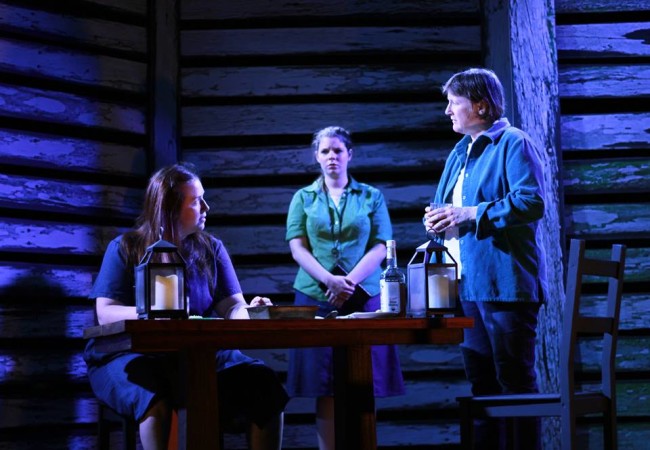
Katie Hileman is playing my daughter, “the chose.” She’s wonderful and fantastic. She’s really talented. And so is Erin Hanratty, who is the other actor in the show. They’re both UMBC graduates. Someone has to have a vision of who “the chose” should be and Erin plays the younger half-sister who sees the vision. My original script is a little bit Iphigenia, a little bit Night Mother, a little bit Saint Joan, a little bit The Crucible, and a little bit Little Abner.
Is this an all-female production?
Susan: So the actors are all female, it’s three women, myself, Erin, and Katie. But there’s a whole town outside which has a lot of male pressure in it, with the fathers and the grandfathers. They’re all part of what’s making this little crucible burn. One of the challenges but also the really great things about this piece is that it is just these three women. Sometimes I wish I could have someone come into it, but no, it’s just these three people in this room in this very kind of tragic way. It exists in this very American history family drama kind of way, the mother, the daughter, and the step-sister.
It’s exciting that this is a part of the Women’s Voice Theater Festival. What has that been like?
Susan: That project has been so successful. To get my face on the cover of American Theatre Magazine, it’s just an honor. To get the opportunity to expose my work among the 50-some other works that are being featured is incredible.
I feel almost anti-feminist saying this, but it feels like there are some really great works coming out of the festival and some not so great works, but when the great works have arisen, that’s a wonderful thing to celebrate.
Susan: That doesn’t have to be an anti-feminist sentiment at all. In the kick-off event where Lisa Kron spoke, she said one of the most brilliant things I’ve heard in regards to this issue of parity. She said that what needs to happen is that there needs to be as many bad plays being produced by women as there are by men. There becomes this thing where we’re held to a different standard where we only get this tiny little morsel— here’s this festival and we’re going to do your work for one year, with 50-some productions and they all have to be brilliant. Otherwise it becomes this proof that “female plays aren’t as good.” Plays are incredibly hard to write. And it’s incredibly hard to do a good production of a good play. Most plays are flawed, actually one could argue that every play is flawed, some perhaps more than others. What’s so great about this festival is what it’s allowing us to do.
I mean none of the bigger theatres in DC would even be reading my script outside of this festival, this is a first draft of this play. But now that it’s become a part of the festival, larger theaters around the country are asking to take a look at the script and it’s giving me an opportunity to make changes and to take what I learn from this production and make it better. These are the things that 30-year-old guys are now being granted –the opportunity to rewrite, have a production of something that has strengths and weaknesses and learn from them. This is an opportunity for us to make our work better. That’s the most fantastic part of this process for me.
I’ve seen some of these pieces by “the named playwrights” and those are also deeply flawed or slightly flawed scripts. This festival has created a huge network of opportunity. They have created this awareness around all of these works that I couldn’t have bought or created on my own. I’m really very grateful.
What does it mean to you to be a female playwright? Or maybe just as a playwright?
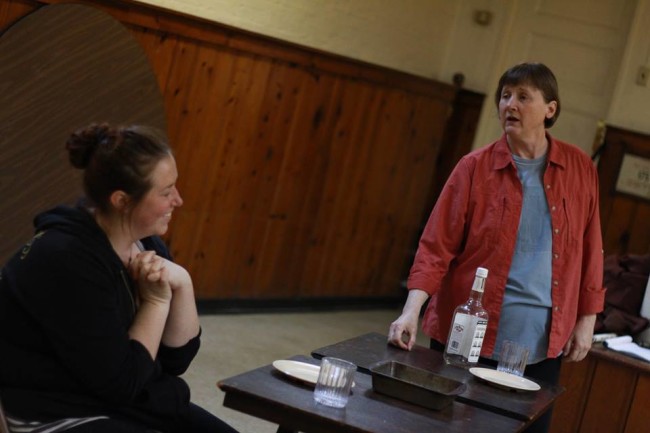
Susan: I proudly write under the banner of a female playwright. I think it’s a really complicated question than people realize. They have preconceived notions, “oh it’s a woman’s voice so it’s different” or thoughts along those lines. I think that it is true that I tell stories where women are the protagonists and the antagonists. But those stories are still universal, I don’t think that they’re exclusively women’s stories. I think people have this idea that with “women’s theatre” or with “female playwrights” there is a certain expectation of how they’re written or what they’re about and then people read them through a biased lens as opposed to these just humans with experiences.
In a way it becomes a bit like the “Black Lives Matter” subject, although that’s always tricky. Yes all lives matter, yes all people have stories, but I don’t want to erase “black lives matter” and I don’t want to erase “women’s stories matter and need to be told” for the sake of standing on this blanketed platform of equality for all. You have to focus on the erasure. All stories need to be told, absolutely, but if you don’t purposefully make room to tell stories from all points of view then by default we see male characters and male playwrights as telling the universal stories when in reality we need a whole bunch of different men and women out there telling their stories. Otherwise we become this thing that gets marginalized, “that thing over there” women’s stories. So I’m proudly a woman playwright.
I think one of the universal truths that I see with women playwrights is that we tend to emerge later in life. At least that’s been true for many of my friends and of myself. It’s harder to get heard. For me, it was harder to feel confident that my work deserved an audience. It took me a while to feel like I deserved an audience and I think that’s gendered in a kind of way. I also had a family. Add in the thing about how all playwrights need other work to support themselves and their family. So I got an MFA in playwrights in my late 20’s but I still had to make a living, so I had to get a PhD to teach to do that. It’s been a long haul to where I now feel like I’m in a good productive place as a playwright, I’ve had three productions in the last eight months. It feels fantastic and I feel so lucky.
What have been the difficulties of this show for you?
Susan: I think I’m discovering that I’m not enjoying being on the stage as much as I used to. Fortunately, I’ve gotten to the point where I have a really good relationship with my director. Eve (Director Eve Muson) has been a really great dramaturg and she’s really been a part of the writing and dramaturgical process. We have this connection where we can watch a play together and speak the same language about it. We feel very much the same about what makes a play work, how to tell the story theatrically and dramatically. I really miss that I can’t do that with her in this production because I’m in it. That’s a really, really different way of thinking about the character and I don’t know why that’s true, but it’s been a big struggle for me. When I’m inside just this one character trying to make the right choices about that character, I really can’t look back and say “Oh, I see how that dialogue or those actions are really working.” I think this might be the last show that I’m in. I know I said that before when I performed Inexcusable Fantasies, but I think I mean it this time.
I think the primary thing, outside of being in the show itself, that with a new work as the playwright when you are out in the audience watching rehearsals, and you’re present for the initial readings, you can say “That moment right there needs to be tweaked.” You can actively see and hear what needs to happen in order to make something much clearer. You can see the completeness of it, you can look for the action of all the characters. You can see much more clearly where changes need to be made. Because I’m in the show, and I’m up on stage during these readings and rehearsals, I can’t actually do the work of the playwright. It makes it really, really hard— actually impossible to know whether or not a beat is working because your focus can’t be on what’s happening outside of my own character. I feel frustrated because I can’t quite clearly see why that beat isn’t working.
I really trust Eve. We have these conversations after rehearsals but my conversations are not informed the way they usually are when I’m watching a script being rehearsed with her. I can’t even hear her notes the same way as I do when I’m just listening to a show as opposed to being in the show directly.
What would you say taking on this project has taught you about yourself as an actor, as a playwright, and as a woman?
Susan: Oh my God. You don’t go easy, do you? What I’ve learned as an actor is truly the value of being on stage with actors who are really good. Both Katie and Erin are really good. They have some quality training and they just keep digging into the script and figuring out what their characters want in those moments and why. I never trained or learned how to do that really well. I haven’t practiced acting in years. I was in Inexcusable Fantasies, but that was a direct address to the audience, here I am as Susan telling a story that was true about me as a frame around these stories that were loosely based on my life in a funny, ridiculous sort of way. I have not practiced the muscle of being an actor in many, many years. Myself is an actor in this case is the least interesting thing to me. But I’m trying to rise to the level of my cast. I hope that I’m creating some moments that really work on the stage.
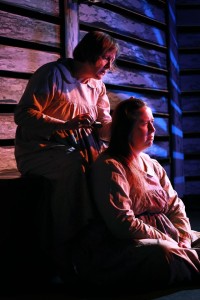
The thing that I’ve learned as a playwright is how to tell a story, or write a play where you really dare to tell some profound and scary truth about yourself. Some of this play is really about how I was raised to be a racist in a racist culture. I just really wanted to tell the truth about that and look at how my own racism was constructed and not make apologies for it, represent it as it is, even in this big tragic frame. It’s really, really scary. But it also feels like I’ve written something that is raw and hard. From time to time I’ve gone up to New York and studied with Karen Hartman who is a really great playwright and a really great playwriting teacher. I’ve taken her word that you want to write a play where it costs you something to write it. I had to keep peeling open things about myself and being willing to expose them and risk them in this process. When you represent these things, you risk representing yourself as a racist. Part of the work that I try to do all the time is to own my white privilege and own my own racism. That’s all you can really do to start. It’s very difficult to look at the way you were raised, seeing how you’ve changed, and still admit that you love those people. Even though you abhor the xenophobia, you have it too. We all do. That’s scary.
I did a playwriting workshop a while ago with Split Britches, they’re a lesbian troupe based out of New York and they’re a stalwart of the queer theatre community since the 80’s and very well known in the academy. They said in this workshop that every piece you work on, you should do one thing that you’ve always wanted to do and one thing that really terrifies you. So at 52 I appear in my underwear in this piece— and that’s the thing that terrifies me— I’m exposing my body at this point in my life. I strip on stage! That terrifies me. I’ve always wanted to do stage combat so there’s stage combat. Part of the ritual of this is place is a scapegoating ritual, “the chose” becomes a bear, there’s bear fighting and bear baiting.
I’ve learned that at this point in my life that craft allows you to explore much more deeply. This is a play that’s really about craft and trying to write in the dialect and patois of Western Pennsylvania. In other plays I’ve written I have this mastery of language and characters, they think while they talk and they have these huge vocabularies. That’s been my MO for a long time. But with this play? These characters barely speak. These are really quiet folk. When they say something they mean it. They have limited vocabulary. The diction is this really narrow range of things and there’s a lot of silences and subtext. I really tried to write a tragedy in the one hour of real time that we have with this show. Craft allows you to explore, it doesn’t limit you. Rules help you tell the story so you can concentrate on character.
As a woman, this play has taught me that the relationships between women are rarely told. There is a narrow range of women’s relationships that get regularly represented. Those conflicts, those desires, they are just as universal and true and important as anyone else’s story. I’ve known that as a person on the street, but as a woman in the theatre what I’ve really learned is that those relationships between women are universal. Mothers and daughters are just as universal as fathers and sons. The power dynamic, the desire to be seen and seen as a real person either to your child or to your parent— it’s the same. All of those things that are traditionally in the father-son struggle are right there in the mother-daughter struggle as well. This has made me really much more secure in my ability to tell a story that everyone and anyone can relate to.
What is it you are hoping people will take away from seeing Kerrmoor?
Susan: I hope that they will see a story about what is really glorious about being a person committed, with a kind of warrior-like passion to doing the right thing, or the thing that they see is the right thing. I hope people will see that as the right things for those characters and see how short-sighted it is to see the world through a really narrow lens.
Why should people come and see Kerrmoor?
Susan: I can assure you that the quality of the production— the production values, the performances, the directing, the script— is as good as any you are going to see in any theatre in Baltimore. With the limitations of that space still intact, the quality of the people who are our designers is really first rate. (Eric Abele, Costume Design; Adam Mendelson, Lighting Design; Gregg Schraven, Set Design; Jeffrey Dorfman, Sound Design). I think that this show is a really provocative piece that really thinks very deeply about white America, which I think is an important story to tell in Baltimore. Plus, you need a catharsis? There’s a catharsis.
Kerrmoor plays through November 15, 2015 as a part of the Women’s Voices Theater Festival as a Co-Production with Strand Theatre and Interrobang Theatre Company at the Emmanuel Episcopal Church— 811 Cathedral Street in Baltimore, MD. Tickets may be purchased at the door or in advance online.

